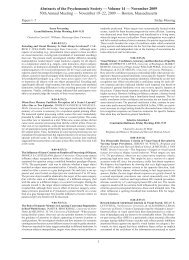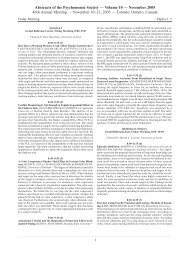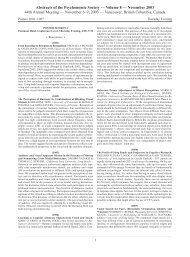S1 (FriAM 1-65) - The Psychonomic Society
S1 (FriAM 1-65) - The Psychonomic Society
S1 (FriAM 1-65) - The Psychonomic Society
You also want an ePaper? Increase the reach of your titles
YUMPU automatically turns print PDFs into web optimized ePapers that Google loves.
Posters 4111–4116 Saturday Noon<br />
tal, ROBYN WESTMACOTT, Hospital for Sick Children, & MORRIS<br />
MOSCOVITCH, Rotman Research Institute, University of Toronto—<br />
Recently there has been interest in how episodic memory aids and<br />
contributes to performance on semantic tasks. We investigated the<br />
contribution of recollection on a categorization task. Participants were<br />
asked to categorize names of famous people to their proper field (e.g.,<br />
arts, sports, politics, etc.) and were presented with two choices. Participants<br />
were faster and more accurate when they had a personal<br />
memory associated with a famous name than when they did not, even<br />
though the names were matched for familiarity and the number of<br />
facts associated with them. fMRI data revealed that left medial temporal<br />
lobe activation during categorization was greater for famous<br />
names that evoked a personal memory relative to the famous names<br />
that were correctly categorized but had no personal memories associated<br />
with them. Although autobiographical episodic memories are not<br />
necessary in order complete the task, recollection of episodic content<br />
appears to be invoked when available.<br />
(4111)<br />
Careful Inspection of Memory Reduces Recognition Memory Accuracy.<br />
J. THADEUS MEEKS, University of Georgia, GABRIEL I.<br />
COOK, Claremont McKenna College, & ARLO CLARK-FOOS, GENE<br />
A. BREWER, & RICHARD L. MARSH, University of Georgia—Intuitively,<br />
if one inspects memory more closely, one should be more accurate<br />
in reporting the results of that inspection. We addressed this<br />
issue by comparing conditions in which people had to discriminate remembering<br />
from knowing when they claimed an item was old with<br />
their rationales for claiming that new items were new. In the latter<br />
case, we asked whether items lacked familiarity, whether they would<br />
have been remembered if studied, or whether a recall-to-reject strategy<br />
was being employed. In comparison with standard recognition<br />
memory, both of the more detailed inspection strategies resulted in<br />
worse recognition memory performance. <strong>The</strong> result was replicated<br />
using 3 old response options and 3 new options compared with standard<br />
recognition memory, and it even replicated in a sequential judgment<br />
condition too. One possibility for this counterintuitive result is<br />
that maintaining many qualitative response options in working memory<br />
actually acts as a cognitive load and reduces performance.<br />
(4112)<br />
Giving a More Specific Warning Increases Errors Learned From<br />
Fiction. LISA K. FAZIO, SAMUEL SCHNUR, & ELIZABETH J.<br />
MARSH, Duke University (sponsored by Elizabeth J. Marsh)—Readers<br />
learn both true and false information from fictional stories (Marsh,<br />
Meade, & Roediger, 2003). Warning readers that a story may contain<br />
errors does not reduce suggestibility. Suggestibility is only reduced<br />
when readers evaluate each individual sentence for errors. Sentenceby-sentence<br />
evaluation likely teaches readers what kinds of errors are<br />
embedded in the story, whereas the general warning could be interpreted<br />
in many different ways (e.g., that the overall premise of the story<br />
is fictional). We created a more specific warning that highlighted the<br />
type of error embedded in our stories. In the trial-by-trial monitoring<br />
condition, the more specific warning increased the detection of errors<br />
but did not affect later suggestibility. Control subjects suffered with a<br />
specific warning, producing more misinformation on the final test. <strong>The</strong><br />
specific warning presumably increased attention to the story errors,<br />
leading to their fluent retrieval later, with negative consequences.<br />
(4113)<br />
Recognition of Details Never Experienced: <strong>The</strong> Effects of Encoding<br />
and Age. ROBYN E. HOLLIDAY, University of Kent, & CHARLES J.<br />
BRAINERD & VALERIE F. REYNA, Cornell University—Childnormed<br />
lists of categorical items were used to investigate whether encoding<br />
list items as pictures or whole words or word fragments would<br />
affect 7-, 11-, and 13-year-olds’ recognition of studied words (targets)<br />
and meaning-related unpresented words (critical lures). Children<br />
studied one block of three lists as pictures, one block of three lists as<br />
whole words (read condition), and one block of three lists as word<br />
121<br />
fragments (self-generate condition). In all three encoding conditions,<br />
the to-be-studied item was first presented for 2 sec as a word in black<br />
lowercase letters. This word was then replaced by a picture, or the<br />
whole word (read condition), or a word fragment (self-generate condition).<br />
Each block was followed by a recognition test of whole words<br />
under repeated measures conjoint recognition retrieval instructions<br />
(verbatim, gist, verbatim + gist). <strong>The</strong> encodings were manipulated<br />
within participants. False recognition of critical lures increased with<br />
age, but the age increase was reduced when lists were encoded as pictures.<br />
Findings are discussed in relation to fuzzy-trace theory and the<br />
distinctiveness heuristic.<br />
(4114)<br />
Effects of Bilingualism on Recollection and Familiarity. ZOFIA<br />
WODNIECKA, York University and Rotman Research Institute, FER-<br />
GUS I. M. CRAIK, Rotman Research Institute, & ELLEN BIALYSTOK,<br />
York University—We examined the effects of bilingualism on recollection<br />
and familiarity in younger and older adults. Previous work has<br />
shown that bilingualism enhances executive functions and offsets agerelated<br />
decline in cognitive control. Since recollection requires executive<br />
control to a greater extent than does familiarity, which is mostly<br />
an automatic process, we predicted that bilingualism would enhance<br />
recollection but would have little effect on familiarity. Younger and<br />
older adult monolinguals and bilinguals studied items (words, abstract<br />
objects, and faces) and then performed both an inclusion recognition<br />
test (in which they responded “yes” to both studied and new items repeated<br />
once after various lags) and an exclusion recognition test (in<br />
which they responded “yes” only to the studied items). In general,<br />
bilingual younger and older adults showed higher levels of recollection<br />
than their monolingual counterparts. <strong>The</strong>se results extend the relationship<br />
between bilingualism and executive control to processes accompanying<br />
retrieval of information from memory.<br />
(4115)<br />
Recollection and Familiarity for Public Events in Neurologically<br />
Intact Older Adults and Brain-Damaged Patients. RALUCA<br />
PETRICAN & MORRIS MOSCOVITCH, University of Toronto—<br />
Despite extensive investigations of laboratory-acquired memories,<br />
there is a dearth of research on memories formed in real-life settings.<br />
We used the remember–know paradigm to investigate changes in recollection<br />
and familiarity of public events ranging across the life span<br />
of two groups of neurologically intact older adults (old-old, 74–85;<br />
young-old, 58–69) and patients with medial and anterior temporal lesions.<br />
First, in neurologically intact participants, recollection rates decreased<br />
linearly as a function of time elapsed since the event occurred,<br />
at a significantly higher rate than the corresponding decrease in familiarity.<br />
Second, consistent with the age-related semanticization hypothesis,<br />
across decades, old-old participants exhibited lower recollection<br />
(but not familiarity) rates relative to young-old participants.<br />
Finally, medial temporal lesions severely and disproportionately impaired<br />
recollection relative to familiarity, whereas anterior lateral temporal<br />
damage left intact recollective rates. We discuss the present results<br />
in the context of neuroanatomical and process-oriented theories<br />
of memory “aging.”<br />
(4116)<br />
On the Nature and Timing of Perceptual and Conceptual Familiarity<br />
in Recognition Memory: A Comparison Between an Event-<br />
Related Potentials and a Speed–Accuracy Trade-Off Study.<br />
ANGELA BOLDINI & SALVADOR ALGARABEL, University of<br />
Valencia, & ANTONIO IBANYEZ & TERESA BAJO, University of<br />
Granada—Although early dual process theories of recognition memory<br />
(RM) claimed that familiarity is mainly perceptually based, later studies<br />
showed that familiarity can also be semantically based. An eventrelated<br />
potentials (ERPs) study was carried out to investigate electrophysiological<br />
correlates and timings of perceptually based and<br />
conceptually based familiarity processes in RM. Subjects were presented<br />
with categorized pictures at study, whereas perceptual/semantic sim-





